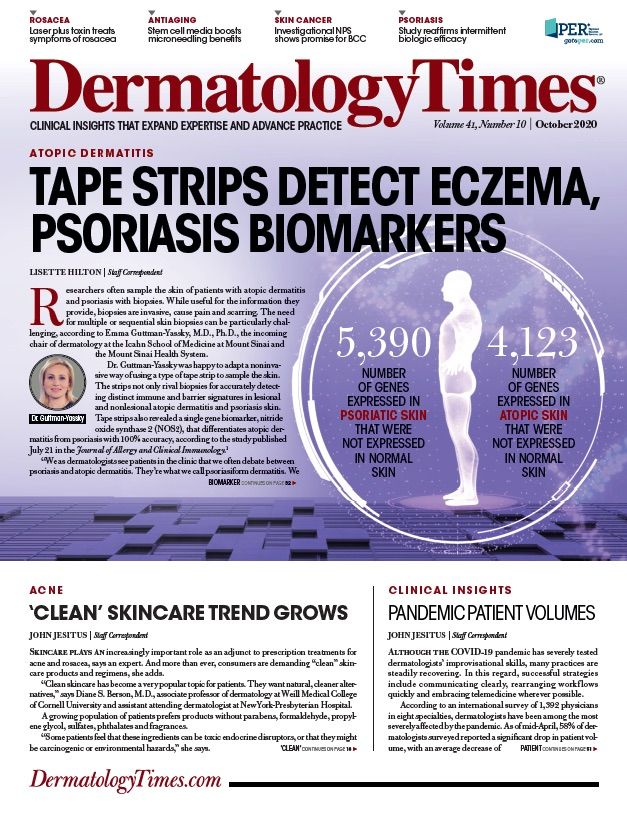- Case-Based Roundtable
- General Dermatology
- Eczema
- Chronic Hand Eczema
- Alopecia
- Aesthetics
- Vitiligo
- COVID-19
- Actinic Keratosis
- Precision Medicine and Biologics
- Rare Disease
- Wound Care
- Rosacea
- Psoriasis
- Psoriatic Arthritis
- Atopic Dermatitis
- Melasma
- NP and PA
- Skin Cancer
- Hidradenitis Suppurativa
- Drug Watch
- Pigmentary Disorders
- Acne
- Pediatric Dermatology
- Practice Management
- Prurigo Nodularis
- Buy-and-Bill
Publication
Article
Dermatology Times
Meta-analysis reaffirms safety, efficacy of intermittent biologic use
Author(s):
According to a recent meta-analysis, patients who stop and restart biologic treatment can regain psoriasis control without experiencing unexpected safety issues.
Stopping and restarting biologic treatment allows most patients to regain psoriasis control without experiencing unexpected safety issues, according to a recent meta-analysis. Although continuous biologic therapy provides optimal results, authors add, the study provides reassurance for patients who reject or cannot obtain continuous treatment.
"This article is a compilation and reminder of something companies have already shown us with their biologic drugs — that when you stop the drug and then restart it, you can expect most of the drugs to work pretty well again," says Steven R. Feldman, M.D., Ph.D., professor of dermatology, pathology and public health sciences at Wake Forest University School of Medicine. He was not involved with the study, which appeared online July 8 in the Journal of the European Academy of Dermatology & Venereology.1
Authors led by Anwar Al-Hammadi, M.D., of Rashid Hospital in Umm Hureir, Dubai, identified 18 studies that reported efficacy and safety data for intermittent use of TNF inhibitors (adalimumab [Humira, Abbvie], certolizumab pegol [Cimzia, UCB], etanercept [Enbrel, Amgen] and infliximab [Remicade, Janssent CarePath]), interleukin (IL)-12/23 inhibitors (ustekinumab [Stelara, Janssen CarePath]), IL-23 inhibitors (guselkumab [Tremfya, Janssen CarePath) and IL-17 inhibitors (brodalimumab [Siliq, Valeant Pharmaceuticals], ixekizumab [Taltz, Eli Lilly] and secukinumab [Cosentyx, Novartis]). Following retreatment, between 60% and 95% of patients reestablished disease control as defined by each study.
RELATED: Counseling patients on biologics in the COVID-19 era
"With the potential exception of infliximab," write Al-Hammadi et al., "the efficacy and safety data published to date demonstrate that intermittent treatment, or the withdrawal and re-initiation of treatment with biologic agents, is able to reestablish disease control in a large proportion of patients, without novel safety concerns."
Among TNF inhibitors, the proportions of patients who regained treatment response ranged from 25% who reached Psoriasis Area and Severity Index (PASI) 75 with infliximab 3 mg/kg, to 87% who achieved PASI 75 with a 400 mg maintenance dose of certolizumab. Infliximab produced more infusion reactions with treatment-as-needed (11% and 9% of patients at 3 mg/kg and 5 mg/kg, respectively) than with continuous treatment (7% and 6%, respectively).
The highest response levels occurred with IL-17 inhibitors. In phase 3 secukinumab trials, 94% of patients reached PASI 75 after 16 weeks' retreatment. Additionally, 82% of patients initially randomized to monthly ixekizumab before re-randomization to placebo regained Physician Global Assessment (PGA) ≤1 after six ixekizumab doses. Among patients retreated with brodalimumab 210 mg, 97% achieved PGA ≤1 after 12 weeks. However, the FDA-approved label for brodalimumab includes a black-box warning regarding a potential link between the drug and suicide.
In real-world practice, write Al-Hammadi et al., intermittent treatment might be more feasible than continuous treatment due to lower healthcare costs, better treatment adherence and time savings for patients. However, Dr. Feldman says that based on his experience, intermittent treatment rarely occurs.
"When we put people on medications for severe psoriasis, the great majority have such severe disease that they need continuous therapy," he says.
Where the meta-analysis is useful, he says, is in situations where patients fail to heed doctors' orders.
"They may stop therapy even though we don't tell them to," Dr. Feldman says.
Some patients did this when COVID-19 first appeared because they were worried that biologic treatments might put them at increased risk.
Similarly, Dr. Feldman says that when biologics were new, patients commonly stopped therapy for fear of potentially increased risks of infection and cancers — risks that subsequent research dispelled. Back when there were only two or three FDA-approved biologics available, he adds, adherence was much more crucial.
"You really didn't want the drug to fail,” he says. “Now, we have a dozen biologics. So if somebody plays with the dosage or doesn't use the drug well, even if they were to lose effectiveness, it's not the end of the world. We have so many choices."
It is unlikely, adds Dr. Feldman, that insurers would seek cost savings by requiring intermittent biologic dosing for some patients. Instead, he says, biologic access barriers are falling.
"Eli Lilly and Company created a system that other companies were forced to follow," Dr. Feldman says.
If a dermatologist prescribes a biologic to a commercially insured patient whose insurance covers the drug but requires a high co-pay, he explains, the drug company covers the co-pay.
"And if the insurer doesn't cover the drug, the pharmaceutical company basically guarantees that patients will get the drug at low cost," he adds.
Outside of government insurance such as Medicare, which might make it difficult to get some patients a biologic treatment, he says that for most patients, biologic access has never been better.
REFERENCE:
1 Al-Hammadi A, Ruszczak Z, Magariños G, Chu CY, El Dershaby Y, Tarcha N. Intermittent use of biologic agents for the treatment of psoriasis in adults [published online ahead of print July 8, 2020]. J Eur Acad Dermatol Venereol. 2020;10.1111/jdv.16803. doi:10.1111/jdv.16803.
DISCLOSURES:
Dr. Feldman has received research, speaking and/or consulting support from a variety of companies including Galderma, GSK/Stiefel, Almirall, Alvotech, LEO Pharma, BMS, Boehringer Ingelheim, Mylan, Celgene, Pfizer, Ortho Dermatologics, AbbVie, Samsung, Janssen, Eli Lilly, Menlo, Merck, Novartis, Regeneron, Sanofi, Novan, Qurient, National Biological Corp., Sun Pharma and Suncare Research. He also consults for other companies through Guidepoint Global, Gerson Lehrman Group and other consulting organizations. He is founder and majority owner of www.DrScore.com and a founder/part owner of Causa Research.






